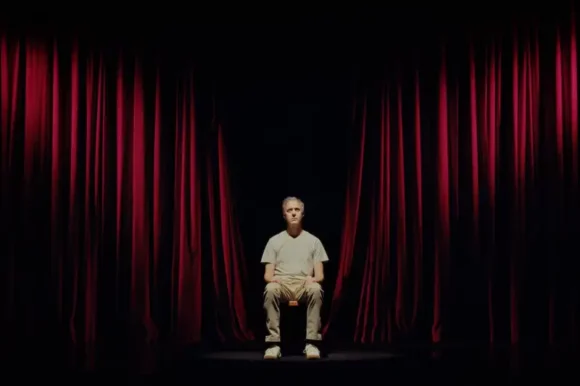Watching The Directors: five short films by Marcus Coates, for New Scientist, 31 August 2022
In a flat on the fifth floor of Chaucer House, a post-war social housing block in London’s Pimlico, artist Marcus Coates is being variously nudged, bullied and shocked out of his sense of what is real.
Controlling the process is Lucy, a teenager in recovery from psychosis. Through Coates’s earpiece, she prompt Coates in how to behave, when to sit and when to stand, what to touch, and what to avoid, what to look at, what to think about, what to feel. Sometimes Coates asks for guidance, but more often than not Lucy’s reply is drowned out by a second voice, chilling, over-loud, warning the artist not to ask so many questions.
A cardboard cut-out figure appears at the foot of Coates’s bed — a clown girl with bleeding feet. It’s a life-size blow-up of a sketch Coates himself was instructed to draw a moment before. Through his earpiece a balloon bursts, shockingly loud, nearly knocking him to the ground.
Commissioned and produced by the arts development company Artangel, The Directors is a series of five short films, each directed by someone in recovery from psychosis. In each film, the director guides Coates as he recreates, as best he can, specific aspects and recollections of their experience. These are not rehearsed performances; Coates receives instructions in real-time through an ear-piece. (That this evokes, with some precision the auditory hallucinations of psychosis, is a coincidence lost on no one.)
So: some questions. In the course of each tricky, disorientating and sometimes very frightening film, does Marcus Coates at any point experience psychosis? And does it matter?
Attempts to imagine our way into the experiences of other beings, human or non-human, have for a long while fallen under the shadow of an essay written in 1974 by American philosopher Thomas Nagel. “What Is It Like to Be a Bat?” wasn’t about bats so much as about the continuity of consciousness. I can imagine what it would be like for me to be a bat. But, says Nagel, that’s not the same as knowing what’s it’s like for a bat to be a bat.
Nagel’s lesson in gloomy solipsism is all very well in philosophy. Applied to natural history, though — where even a vague notion of what a bat feels like might help a naturalist towards a moment of insight — it merely sticks the perfect in the way of the good.
Coates’s work consistently champions the vexed, imperfect, utterly necessary business of imagining our way into other heads, human and non-human. 2013’s Dawn Chorus revealed common ground between human and bird vocalisation. He slowed recordings of bird song down twenty-fold, had people learn these slowed-down songs, filmed them in performance, then sped these films up twenty times. The result is a charming but very startling glimpse of what humans might look and sound like brought up to “bird speed”.
Three years before in 2010 The Trip, a collaboration with St. John’s Hospice in London, Coates enacted the unfulfilled dream of an anthropologist, Alex H. Journeying to the Amazon, he followed very precise instructions so that the dying man could conduct, by a sort of remote control, his unrealised last field trip.
The Directors is a work in that spirit. Inspired by a 2017 residency at the Maudsley psychiatric hospital in London, Coates effort to embody and express the breadth and complexity of psychotic experience is in part a learning experience. The project’s extensive advisory group includes Isabel Valli, a neuroscientist at King’s College London with a particular expertise in psychosis.
In the end, though, Coates is thrown back on his own resources, having to imagine his way into a condition which, in Lucy’s experience, robbed her of any certainty in the perceived world, leaving her emotions free to spiral into mistrust, fear and horror.
Lucy’s film is being screened in the tiny bedroom where her film was shot. The other films are screened in different nearby locations, including one in the Churchill Gardens Estate’s thirty-seater cinema. This film, arguably the most claustrophobic and frightening of the lot, finds Coates drenched in ice-water and toasted by electric bar heaters in an attempt to simulate the overwhelming tactile hallucinations that psychosis can trigger.
Asked by the producers at ArtAngel whether he had found the exercise in any way exploitative the director of this film, Marcus Gordon, replied: “Well, there’s no doubt I’ve exploited the artist.”

